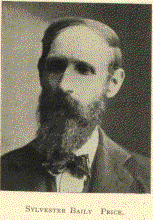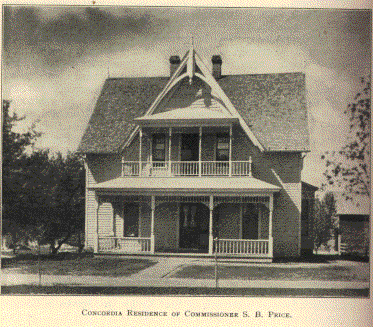 S.B. Price is another pioneer of Cloud county that has prospered and
attained a prominent place in the citizenship of the community. He is a son of
James Voss Price, of the preceding sketch and was born in the state of Kentucky
in 1845, removed to southern Illinois in 1852, and as stated in his father's
sketch, enlisted in Company H, Eighty-first Illinois Volunteer Infantry, August
12, 1862, and in his country's cause until October, 1864, when he was discharged
for disability. His brother, E.R. Price, served until the close of hostilities.
They were in the army of the Tennessee, General John A. Logan being their corps
commander and General McPherson division commander. He participated in the siege
of Vicksburg, Franklin and the Red river expedition. They were subsequently
transferred to the Sixteenth Corps and served in the extreme south. Their last
duties in the army were performed at Mobile. Their company was mustered out of
service at Montgomery, Alabama, and discharged in Chicago. Mr. Price came with
his father's family to Kansas in 1866, and homesteaded land near the present
site of Hollis two years later, where he married Miss Isabell S. Powell,
formerly of Pike county, Illinois, reared a family of five children and became
independent in his possessions of the world's goods. Fannie, their eldest
daughter, is the wife of A.B. Cole, a successful farmer living near Hollis.
Flora Lillian is the wife of Reed Scott, a contractor of Concordia. Florence
Gertrude is the wife of Loren Ashcraft, a railroad man with residence at Wymore,
Nebraska. James A., their only son, is employed as clerk in the grocery of Price
& Moore. He received a business education and training in the Great Western
Business College of Concordia. He is a hard student and to his natural ability
extended travel has added experience which can be obtained from no other course.
Blanche, the youngest daughter and child, is aged fifteen years. She is a pupil
in the eighth grade of the Washington school. She exhibits a decided talent in
music, being especially gifted in that accomplishment. Mr. Price retains his old
homestead near Hollis, along with two other quarter sections. His land is finely
improved, with commodious residence and one of the most modern and complete
barns in the country. This valuable estate illustrates much more forcibly than
words could do the tireless industry and excellent management of its owner. In
March, 1901, Mr. Price retired from farm life, bought the Haskell residence
property on Ninth and Cedar streets and removed his family there. Shortly after
this event Mr. Price became associated with A.R. Moore, under the firm name of
Price & Moore, and purchased the Key stock of groceries. The principals in this
combination are both well and favorably known, and have already built up a
prosperous business.
S.B. Price is another pioneer of Cloud county that has prospered and
attained a prominent place in the citizenship of the community. He is a son of
James Voss Price, of the preceding sketch and was born in the state of Kentucky
in 1845, removed to southern Illinois in 1852, and as stated in his father's
sketch, enlisted in Company H, Eighty-first Illinois Volunteer Infantry, August
12, 1862, and in his country's cause until October, 1864, when he was discharged
for disability. His brother, E.R. Price, served until the close of hostilities.
They were in the army of the Tennessee, General John A. Logan being their corps
commander and General McPherson division commander. He participated in the siege
of Vicksburg, Franklin and the Red river expedition. They were subsequently
transferred to the Sixteenth Corps and served in the extreme south. Their last
duties in the army were performed at Mobile. Their company was mustered out of
service at Montgomery, Alabama, and discharged in Chicago. Mr. Price came with
his father's family to Kansas in 1866, and homesteaded land near the present
site of Hollis two years later, where he married Miss Isabell S. Powell,
formerly of Pike county, Illinois, reared a family of five children and became
independent in his possessions of the world's goods. Fannie, their eldest
daughter, is the wife of A.B. Cole, a successful farmer living near Hollis.
Flora Lillian is the wife of Reed Scott, a contractor of Concordia. Florence
Gertrude is the wife of Loren Ashcraft, a railroad man with residence at Wymore,
Nebraska. James A., their only son, is employed as clerk in the grocery of Price
& Moore. He received a business education and training in the Great Western
Business College of Concordia. He is a hard student and to his natural ability
extended travel has added experience which can be obtained from no other course.
Blanche, the youngest daughter and child, is aged fifteen years. She is a pupil
in the eighth grade of the Washington school. She exhibits a decided talent in
music, being especially gifted in that accomplishment. Mr. Price retains his old
homestead near Hollis, along with two other quarter sections. His land is finely
improved, with commodious residence and one of the most modern and complete
barns in the country. This valuable estate illustrates much more forcibly than
words could do the tireless industry and excellent management of its owner. In
March, 1901, Mr. Price retired from farm life, bought the Haskell residence
property on Ninth and Cedar streets and removed his family there. Shortly after
this event Mr. Price became associated with A.R. Moore, under the firm name of
Price & Moore, and purchased the Key stock of groceries. The principals in this
combination are both well and favorably known, and have already built up a
prosperous business.

CONCORDIA RESIDENCE OF COMMISSIONER S. B. PRICE.
During the early settlement of the county the Price family endured all the incidents due to frontier life and for months were in constant dread of the savages who committed depredations in near by settlements, but the people of this locality fortunately escaped. The Wards that were massacred on White Rock came from southern Illinois, and from the same vicinity as the Prices, whose intentions were to join them on the White Rock, but hearing of the Indian uprising along that creek, they stopped in Lawrence township. Mr. Price was on horseback, carrying a plow share to a neighbor one day when he sighted three Indians mounted on their ponies, who were riding rapidly in his direction. The dismayed settler put the spurs to his horse and hurriedly gained entrance to the house of a neighbor by the name of Hodge. A moment later the savages came pell mell and suddenly halted at the door. Mr. Hodge had told our subject when the command was given to fire he was to instantly respond. With an eagle eye and quivering with excitement, Mr. Price mistook a movement for a signal to fire and brought his gun into position, whereupon Mr. Hodge, with a sudden motion knocked the gun aside. The act was a bit of strategy on the part of the frontiersman, who was familiar with Indian characteristics. They saw the gun, thought there was more in reserve and beat a hasty retreat, as he anticipated they would.
During the uprising in 1868, William Christy, a brother-in-law (now of Concordia), loaded their wagons with household effects and started for a place of safety, he and his family going to the Lawrence homestead, where they found Mrs. Lawrence at home alone. His brother, Henry Christy, drove the oxen that were drawing the load of goods and when he reached the vicinity of Upper creek he discovered an object which he felt assured was an Indian, and, believing in the old adage, "He who runs away, will live to fight another day," turned the oxen loose, left the wagon and, with the swiftness of a hunted deer, flew on foot to Lawrenceburg. Upon reaching the Lawrence home he hurried the inmates of the little dwelling into a skiff. Mrs. Lawrence, while making her exit, detained the frightened party by sticking fast in the mud. Mr. Christy pulled her out in due time, just as the supposed Indian rode up with the gun Henry had left on the prairie in his flight, and was picked up by this neighboring settler, who was watching for the appearance or movements of the Indians from this high point of land.
Mr. Price passed through the Otoe village in 1866 and ate dinner with the agent. The camp was deserted, the Indians being off on a hunting expedition. They visited the burial ground and found three cottonwood coffins on the top of oak trees. He and his comrades were boys, and, having a curiosity to know if the warriors' guns were buried with them, pried one end of the coffin off, but found nothing had accompanied the body to the happy hunting grounds. On this same trip Mr. Price and his two companions gave an Indian some tobacco for the use of his pony to ride to Marysville, twelve miles distant. The suspecting savage walked directly in front of them all the way, saying, "White man mean; can't trust him." When they arrived home they found the doors barred, in consequence of what proved to be an unfounded report that the savages were coming through on the warpath, and their reinforcement was gladly welcomed. But when they came, the family figured they had been hunted down and run in, as the mischievous boys led them to believe, and after listening to their hairbreadth escape, Ed. Powell, a brother-in-law, turned to his wife and hopelessly remarked, "Well, Margaret, hear that; no use staying here any longer. Let's go back." This circumstance he was often reminded of later.
Politically Mr. Price is a Republican and is one of the county commissioners. He is a member of the Grand Army of the Republic and takes an interest in the organization of old veterans. Mrs. Price is a member of the Christian church and a very estimable woman.
![]()
Transcribed from E.F. Hollibaugh's Biographical history of Cloud County, Kansas biographies of representative citizens. Illustrated with portraits of prominent people, cuts of homes, stock, etc. [n.p., 1903] 919p. illus., ports. 28 cm. Scanned from a copy held by the State Library of Kansas.
New Index
A | B | C | D | E | F | G | H | I | J | K | L | M | N | O | P | Q | R | S | T | U | V | W | Y | Z
